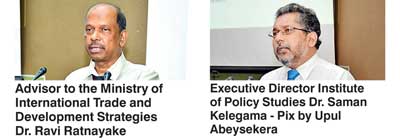Wednesday Feb 18, 2026
Wednesday Feb 18, 2026
Wednesday, 21 September 2016 00:01 - - {{hitsCtrl.values.hits}}
 By Madushka Balasuriya
By Madushka Balasuriya
Experts involved in Free Trade Agreement (FTA) negotiations bemoaned misinformation of the deals including the pending agreement with India, and insisted Sri Lanka needed to formulate its trade policy parallel to FTA negotiations to finally catch up to global competitors.
Several professional organisations, spearheaded by the Government Medical Officers Association (GMOA), have demanded that the Government first put in place a National Trade Policy before embarking on trade agreements, particularly the contentious Economic and Technology Cooperation Agreement (ETCA), which the Government hopes will be signed by the end of this year.
“Our ship has already sailed. We need to accelerate the processes. We need to conduct cost/benefit analysis, we need to formulate and implement better regulatory structures, but all of this needs to be done in parallel to negotiating trade agreements,” said former United Nations Director of Trade and Investment and Advisor to the Ministry of International Trade and Development Strategies Dr. Ravi Ratnayake.
“Sri Lanka could definitely have benefitted more from its bilateral free trade agreements in the past. We should have been at the forefront after being one of the first South Asian countries to open up trade to the world, but instead we’re lagging behind.”
Sri Lanka’s miserable track record with regard to exports is highlighted by the fact that in 1990 both Vietnam and Sri Lanka were exporting $ 2 billion worth of goods, but a little over two decades later in 2014 Vietnam’s annual exports totalled $ 157.8 billion while Sri Lanka’s was just $ 11.9 billion. Bangladesh by comparison were exporting $ 33.1 billion in 2014, when as recently as 2000 both Sri Lanka and Bangladesh were exporting $ 5.5 billion worth of goods each.
Dr. Ratnayake was addressing a seminar at the Colombo Chamber of Commerce on Monday, aimed at helping the private sector and relevant stakeholders better understand global trade trends and ongoing free trade negotiations and policies involving Sri Lanka. This sort of initiative he believes is needed to combat widespread disinformation, which he highlighted with an anecdote.
“Somebody who was working for a foreign owned logistics company said that there was some trade union action taking place. I asked why. He said, ‘The company has hired 50 Indian labourers under ETCA’.”
ETCA to be clear has not yet been signed. In fact even an official draft has not been released, with it only being available after it was leaked online.
“This just encapsulates the miscommunication and misinformation we have in the country at present. We all have to work towards correcting this, because if not people don’t know.”
Also speaking at the seminar was the Executive Director of the Institute of Policy Studies and Chairman-designate of the Agency for International Trade Dr. Saman Kelegama, who rejected calls by certain stakeholders to formulate regulatory policy prior to negotiating trade deals, noting that the two were not mutually exclusive.
“Trade acts as a trigger for regulatory reforms. When the CEPA negotiations started all regulatory reforms were moving, but the moment CEPA talks came to an end in 2008 all discussions in regard to regulatory reforms came to a standstill. At least ETCA, as well as the China-SL FTA initiatives, have triggered regulatory reforms in this country. So we have to take it in parallel with the FTA.
“Without the FTA if you talk about getting the domestic act together it will never happen. That is the practical reality,” he told the gathering.